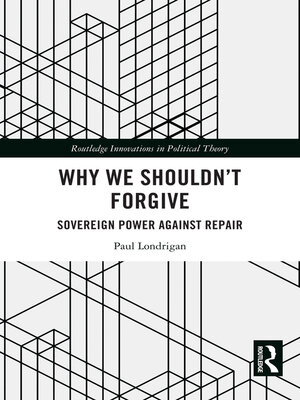Why We Shouldn't Forgive
ebook ∣ Sovereign Power Against Repair · Routledge Innovations in Political Theory
By Paul Londrigan

Sign up to save your library
With an OverDrive account, you can save your favorite libraries for at-a-glance information about availability. Find out more about OverDrive accounts.
Find this title in Libby, the library reading app by OverDrive.



Search for a digital library with this title
Title found at these libraries:
| Library Name | Distance |
|---|---|
| Loading... |
Why We Shouldn't Forgive invites you to understand how the practice of political forgiveness and sovereignty has changed, evolved, and developed over time.
Political forgiveness is an awesome power that bears the promise of great benevolence, but this does not mean, as Paul Londrigan argues, that we should forgive. By engaging with the subject of political forgiveness in relation to sovereignty, Londrigan offers original insights into forgiveness as part of an analysis of prerogative power. As a result, what forgiveness does, and how it has been understood in the history of political thought, becomes intelligible. Six substantive chapters that investigate and substantiate the argument that we should not forgive follow the introduction. Each chapter adopts a seminal figure in the history of political thought beginning with Niccolò Machiavelli, and charts a course through Jean Bodin, Thomas Hobbes, John Locke, and Alexis de Tocqueville. As the chapters unfold across thinkers and through time, they build on one another. The resulting narrative illustrates how political forgiveness and sovereign power have evolved, and crucially, how the anxieties and preoccupations of his interlocutors change in accordance with who exercises sovereignty and who benefits or suffers from the dispensation of forgiveness.
Why We Shouldn't Forgive fills an important gap in advancing this fascinating field of research. This book is required reading for students and academics interested in contemporary approaches to reparative politics, studies of post-conflict reconciliation, and those who seek a deeper understanding of the politics of pardon and amnesty, as well as scholars who engage with critiques of sovereign power.







